From The Booking Desk:
BOLO Books is honored to be joined today by Sophie Hannah, author of the Charlie Zailer and Simon Waterhouse mystery series, award-winning short stories and incredible poetry. Read on to find out just how she creates some of the most unique crime fiction being produced today…
BOLO Books: In most mystery novels, the detective (either professional or amateur) is the focus of the story, but in your books they are never the “main” characters. Each novel is really the story of the participants in the crime itself, with the detective’s investigation serving as a counter-point. How did you come up with that style?
Sophie Hannah: Well, when I decided I wanted to write crime fiction, I thought about my favourite sub-genres within the genre. Two of these – the main two, in fact – were the returning series detective subgenre (for example Inspector Morse, Inspector Wexford, Kinsey Millhone), because if I liked the detective/s, I would always look forward to meeting them again in the next book, and my other favourite subgenre is the very visceral and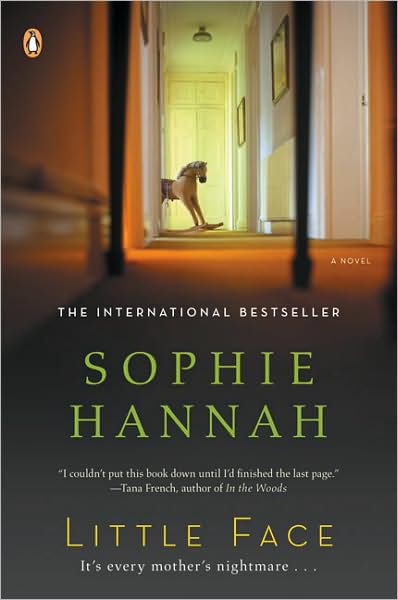 emotional first-person-narrated woman-in-peril psychological thriller, of the sort written by Joy Fielding, whose brilliant novels See Jane Run and Tell Me No Secrets had a profound effect on me. I decided that there was no reason why I shouldn’t mix these two subgenres within one novel (and, later, within a series of novels that are part series and part standalone) to create a new kind of hybrid subgenre. Interestingly, I was told by many people that this couldn’t work, but since I’d had long years of experience of being told that what I wanted to do was for some reason out of bounds, and ignoring all such sanctions, I chose to try it anyway, in my first crime novel Little Face. I found that my narrative approach really helped me to tell the story ‘in the round’ – the reader gets the story from the police point of view, but also from the point of view of the heroine-in-peril, who is really the main character and whose life is falling apart as a result of the events in the novel. I think that, in order to generate that crucial sense of ‘Oh, my god, everything is at stake here’, you need the main character of a crime novel to be someone personally and not merely professionally affected by the crime. I get tired of reading series detective novels in which the only characters we really care about and are invested in are the detectives themselves and everyone else is just transient plot fodder! Also, alternating between police and non-police protagonists’ points of view enables each side to doubt and question the other’s stories/perspectives.
emotional first-person-narrated woman-in-peril psychological thriller, of the sort written by Joy Fielding, whose brilliant novels See Jane Run and Tell Me No Secrets had a profound effect on me. I decided that there was no reason why I shouldn’t mix these two subgenres within one novel (and, later, within a series of novels that are part series and part standalone) to create a new kind of hybrid subgenre. Interestingly, I was told by many people that this couldn’t work, but since I’d had long years of experience of being told that what I wanted to do was for some reason out of bounds, and ignoring all such sanctions, I chose to try it anyway, in my first crime novel Little Face. I found that my narrative approach really helped me to tell the story ‘in the round’ – the reader gets the story from the police point of view, but also from the point of view of the heroine-in-peril, who is really the main character and whose life is falling apart as a result of the events in the novel. I think that, in order to generate that crucial sense of ‘Oh, my god, everything is at stake here’, you need the main character of a crime novel to be someone personally and not merely professionally affected by the crime. I get tired of reading series detective novels in which the only characters we really care about and are invested in are the detectives themselves and everyone else is just transient plot fodder! Also, alternating between police and non-police protagonists’ points of view enables each side to doubt and question the other’s stories/perspectives.
BOLO Books: Over the course of the series, the core group of supporting characters has continued to grow. Has reader reaction to any of the characters surprised you? Have you expanded the role of a character because you sense that readers want to know more?
Sophie Hannah: The confusing thing about readers’ reactions is that they’re all different – so I can’t really try to give my readers what they want, in terms of development of the core characters, because every single person who expresses an opinion or asks for something to happen says something new and fascinating and miles away from everything I’ve heard before! So the only thing I can do is develop the series characters and their storylines in the way that feels right to me. DC Chris Gibbs, who was originally a minor semi-comic character, has become far more prominent and acquired more emotional gravitas and prominence as the books have progressed. And all the core characters have changed and developed in ways that have felt quite organic and spontaneous – as if it’s just happened, rather than been decided and engineered by me. It’s quite spooky!
BOLO Books: The crimes in your novels often involve everyday people doing everyday things when something less mundane happens to them. What is it about the everyday 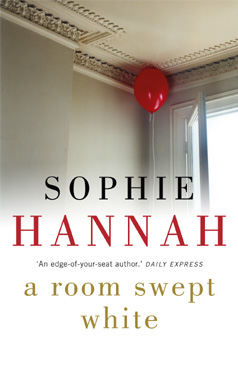 that draws you, rather than say stories involving serial killers, mafia kingpins, or some other type of career criminal?
that draws you, rather than say stories involving serial killers, mafia kingpins, or some other type of career criminal?
Sophie Hannah: If you take an ordinary-seeming, functional-seeming character with a recognizable everyday life, and then make something odd and frightening and dangerous happen to them, it’s even more scary and powerful because of the contrast between the familiar and the outlandish/sinister. I’m not interested in writing about mafia, career criminals or any kind of organized or professional crime because those aspects of the criminal world tend to involve the profit motive and work almost like a business. For me, that’s more at the ‘makes some kind of sense even to normal people’ end of the crime spectrum. I’m more interested in unusual or dysfunctional personal relationships and the warped minds of individuals – in the kind of psychological deviancy that literally makes no sense apart from in the head of one severely damaged human being. I like to make sure that the motives behind the crimes in my novels are ‘non-transferable’, in other words: each motive is one that could only ever apply to that precise character in that precise combination of circumstances. My motives for fictional murder are often quite exceptionally weird and idiosyncratic. In my books, no one ever murders anyone else in order to inherit their money, for example – that’s a transferable motive than any number of murderers might have, so I’m not interested in it.
BOLO Books: Long-time readers of your series know that a Sophie Hannah plot is going to be complex and that minor details will likely become very important as the story progresses. Do you outline your books? How do you manage to weave disparate stories together so that the connections become not only plausible, but also inevitable?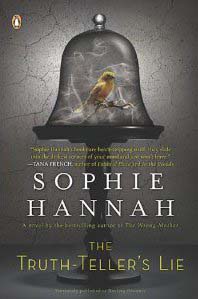
Sophie Hannah: Yes, I do outline, and I never start writing Chapter 1 until I know I’ve got the whole plot sorted out. A lot of crime writers say they don’t know what’s going to happen until they discover it through the process of writing the novel – I’ve heard both Ruth Rendell and Minette Walters say this – but I can’t risk taking this approach because of the kind of plot hooks I always start with. I like to open my novels with very weird, almost-impossible-seeming scenarios, and often it takes me a while to solve the mystery myself (at the planning stage) of what could possibly be the explanation for such weird events. I consider myself lucky if I’m able to think of one solution that can work for each mystery I create. I wouldn’t dare start writing with the hope that such a resolution would just come to me at some point during the writing process; I need to know before I start Chapter 1 that I’ve got a great ending to go with my initial puzzle, and usually I end up feeling that there is honestly only one – only one possible story that will make sense of the apparently inexplicable opening scenario. So far, thank goodness, I’ve never had to abandon a brilliant idea for a beginning of a crime novel because I couldn’t think of an ending I was happy with.
BOLO Books: You are also an accomplished poet. Does your work in the poetry field manifest itself in the way you approach and write narrative fiction?
Sophie Hannah: Yes, I’m very fussy and particular about the rhythm of the prose. I want it to be seamless and unobtrusive, so that readers can concentrate on the flow and pull of the story. I spend a lot of time reading and rereading what I’ve written, to check that both the writing and the overall structure are balanced, shapely and as elegant as possible, rather than clunky and awkward.
BOLO Books: Let’s talk about titles for a minute. Readers of my blog know that I love a good title and you manage to get it right every time. Most of your books have different titles in the UK than they do in the US, but in both cases, the title seems to be perfect. Do you come up with them yourself? Can you share an interesting title anecdote with us?
Sophie Hannah: I am obsessed with titles! My all-time favourite crime novel is Barbara Vine’s A Dark-Adapted Eye, and I love the title too. So many mystery novels have titles that, to me, say, ‘I’m just another run-of-the-mill thriller’: ‘Dead Cold’, ‘Dead Kill’, ‘Deadly 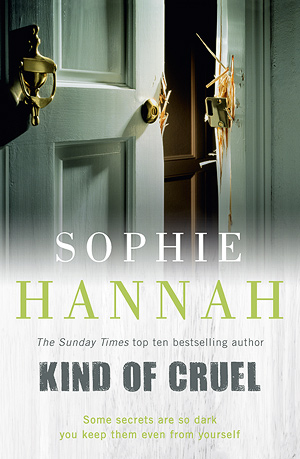 Death’ – that kind of thing. I like unique, sophisticated, intriguing titles – things like An Instance of the Fingerpost and Before I Go To Sleep that make you think, ‘Ooh, I wonder what that could be about?’ For me, finding the right title is a crucial part of the inspiration. So with Kind of Cruel, for example, I thought of the title first and it really resonated with me – I built the entire story around those three words! There’s something poetically magnetic about a great title – they always inspire me.
Death’ – that kind of thing. I like unique, sophisticated, intriguing titles – things like An Instance of the Fingerpost and Before I Go To Sleep that make you think, ‘Ooh, I wonder what that could be about?’ For me, finding the right title is a crucial part of the inspiration. So with Kind of Cruel, for example, I thought of the title first and it really resonated with me – I built the entire story around those three words! There’s something poetically magnetic about a great title – they always inspire me.
I’ve thought of some of my US titles but not all of them. So, I thought of The Dead Lie Down and The Cradle in the Grave, but my US publishers thought of The Truth-Teller’s Lie and The Wrong Mother. I actually quite like having two titles for each book – it enables me to kind of pretend I’ve written twice as many books as I have!
BOLO Books: Along with the book titles, your publishers also manage to get the perfect cover image each time. A Sophie Hannah book has a very distinct “look” to it. Are you happy with what they have done? In each case, while the images seem like nice domestic settings, there is always something just a little off about it.
Sophie Hannah: I adore my book jackets – both in the US and the UK. I think they’re stunning and perfectly reflect the subject matter and tone of my novels. Yes, you’re right – familiar domestic scenes but with some aspect of the picture being badly wrong!
BOLO Books: Your next book is a novella called The Orphan Choir. It seems to be a bit of a departure for you. Tell us a bit about it.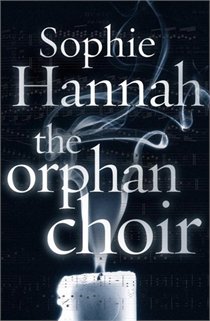
Sophie Hannah: Well, it’s still very much a mystery, but this time there are no police and it’s supernatural: ghosts behaving dysfunctionally rather than humans. Though, in fact, there are also many dysfunctional humans in it! But, seriously, it’s the story of a woman who is haunted by a choir of ghostly children called The Orphan Choir – she doesn’t know who they are or what they want at first, and when she finds out…it’s more terrifying than she could ever have imagined… (cliffhanger!)
BOLO Books: And what is next for Charlie, Simon and the gang from the series mysteries?
Sophie Hannah: Next from Simon and Charlie is their 2014 novel, The Telling Error. Here is a very short synopsis:
Stuck in a traffic jam on her way to deliver her son’s forgotten sports kit to school, Nicki Clements sees a face she hoped never to see again. It’s definitely him, the same police officer; he’s stopping all the cars on Elmhirst Road one by one, talking to every driver. Keen to avoid him, Nicki does a U-turn and takes a long and inconvenient detour, praying he won’t notice her panicky escape.
He doesn’t, but a CCTV camera does, as Nicki finds out when detectives pull her in for questioning the next day in connection with the murder of Damon Blundy, controversial newspaper columnist and resident of Elmhirst Road.
Nicki can’t answer any of the baffling questions detectives fire at her. She has no idea why a killer might sharpen nine knives at the murder scene, then use two blunt ones to kill, in a way that involves no stabbing or spilling of blood. She doesn’t know what ‘HE IS NO LESS DEAD’ means, or why the murderer painted it on the wall of Damon Blundy’s study. And she can’t explain her desire to avoid Elmhirst Road on the day in question without revealing the secret that could ruin her life. Because, although Nicki is not guilty of murder, she is far from innocent…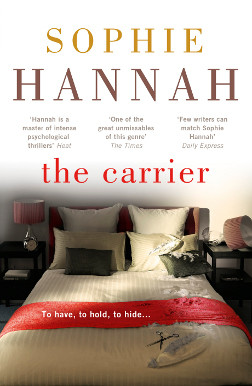
BOLO Books: If forced to choose only one format for all your future reading, which would you choose: Hardback, trade paperback, mass-market paperback, or e-book? And why?
Sophie Hannah: Definitely not ebook. I’ve never read one, in fact. I prefer paper books – I spend enough time looking at screens for work purposes as it is, and they always get greasy and have to be cleaned, but one is always too lazy (or at least I am!) So I’d end up trying to read through a blur of greasy fingerprints – ugh. I’d probably choose mass-market paperback – light, attractive and generally wonderful.
